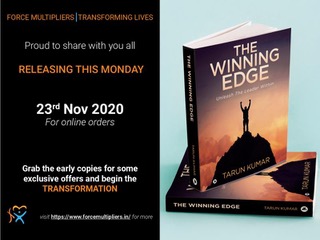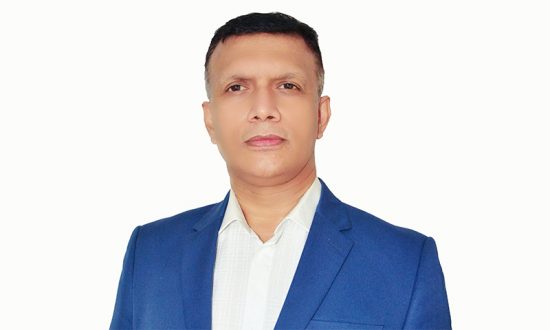Armed forces have this unique distinction of producing some of the best leaders in the world who are brave, decisive, selfless, and dedicated. Today, the corporates face similar challenges faced by the Armed Forces; hence, lessons learned in the military are more valuable and transferable than ever. These transferrable skills are customized under Battlefield to Boardroom strategies to meet every organizational/individual requirement. Col Tarun Kumar (Retd) is a hotel management graduate turned professional soldier who worked with the Indian Army for three decades. During his stint with the Indian Army, he was in-active combat and became a battle casualty during hostile operations. He has served as UN Peacekeeper and has been an instructor teaching leadership and operational strategies to officers at the prestigious National Defence Academy – Cradle of Military Leadership.
Today, Col Tarun Kumar (Retd) works with entrepreneurs, small business owners, professionals, and Corporates to help them emerge as leaders by overcoming their limiting beliefs, enabling them to scale up their performance, leading to commanding respect they so rightfully deserve. His new book, The Winning Edge – Unleash the Leaders Within, is an attempt to acquaint you with the belief that Leaders are made, not necessarily born. In a conversation with CXO Outlook, Col Tarun Kumar (Retd) talks about his book, his journey as a writer, aspirations and much more.
Have you always wanted to be a writer? What inspired you to start writing “The Winning Edge”?
We all have a writer hidden in us looking for the right opportunity to share their wisdom with the world. I have been a voracious reader of all kinds of content, be it fiction, self-help, autobiographies, Military history, comics, and more. While reading, I would empathize or put myself in the protagonist’s shoes and feel the emotion immersed in the narrative. My transition to the army was bordering on adventure and full of exciting incidents, enabling me to be a better person. I have been contemplating to write my experiences in army life. Soon I realized that who would be interested to read the inner conflicts of a soldier, and many wouldn’t connect with the stories as they would be missing the context. The day I decided to hang my boots, writing was on the cards. I was a battle-hardened soldier with close to three decades of experience in people and the ability to navigate through difficult situations. Hence, I decided to address the concept of Leadership for professionals and entrepreneurs of today who are dealing with similar challenges as faced by the Armed Forces.
The lessons learned in the military are more valuable & transferable than ever. A startup is a problem solver, and the entrepreneurial journey is a roller coaster ride of variable dimensions. I help startups discover their infinite mindset for success. In the Indian context, Leadership is synonymous with political leaders and local leaders. I wanted to demystify this concept that leaders are made and not necessarily born, which manifested in my foray into the field of writing. The pandemic came as a boon wherein I could complete my book.
What, in your opinion, are the most important elements of good writing?
Today, we have people who are in the habit of reading books backward, and they are either interested in the cover of the book or the summary behind it. I consider that if one is writing a book, one must consider the following-
(a) What message do you want to convey? If I say, are you helping or solving a problem or teaching a lesson, you must have a clearly defined purpose before writing a book? The message is the theme that ensures you have a strong opening, including the narrative, the storyline, and the language, ensuring you stay on track. Ensure the topic is either one of its kind or brings a unique perspective to it.
(b) What is the takeaway for the reader? If possible, offer a crucial takeaway like I have attempted demystifying the concept that Leadership has nothing to do with your pay grade or position in the organization but with how you influence others. So the golden rule is, to begin with, the end in mind have a clearly defined goal.
(c) Now comes the most crucial part, where the process to bridge the gap between the problem and solution needs attention. How will it fructify? While offering this, you must ensure that it is universally applicable, is simple, and doable for most readers with a reasonable chance of success. We must avoid ambiguity on this aspect as it will be a big let-down and frustrating for the reader.
(d) If there is research or examples, it leads to credence – Having personal experience is a great way to start building your authority. It is vital to carry out adequate research and up-to-date inputs to help others as best you can as an author. If you are in a particular zone or niche, you place yourself as a knowledgeable leader.
(e) Impact on the readers – Ensure that people feel they can also accomplish whatever they set out to achieve. Readers must feel encouraged and consider that it is within their reach to bring out the transformation. The result is feeling motivated and inspired to take the next step to success.

Tell us about “The Winning Edge”? What was the journey like?
The Winning Edge was an experience, and as it was nearing close, the exhilaration was rising. It was a labor of two years which fructified thanks to the pandemic. Initially, I planned to write about my learnings from the army, but midway decided against it as people from the civvy street would not have resonated with my experiences in the death-defying situations. So decided to rework my message and make it appealing to the age group 18-65 years. As they say, the rest is history. My sons helped me in editing, proofreading, and designing the cover. I reached out to some leadership authorities, and Marshall Goldsmith consented to endorse my book. He is World’s No 1 Leadership and Executive Coach, and receiving his endorsement was an ecstatic moment.
What are the takeaways for the readers from “The Winning Edge”?
Do You Have It In You? Leaders are unique people yet human. What makes them special is the way they think. To see oneself as a Leader, you have to change how you measure yourself, and the change one can bring about in the world. Leadership is all about having the discovery of a new belief system. Since childhood, you have worked under pressure from society, culture, and other restraining factors that inhibit your actions. In the bargain, you ended up being other people’s perception of who you are – it is strange but true. This book attempts to acquaint you with the belief that Leaders are not necessarily born but made through baptism under fire. I am hugely passionate about the concept of human brilliance – we become what we think. One asset within any community or organization that truly appreciates is people; therefore, I invest in people and their growth.
What is your work schedule like when you are writing?
When you are deep into writing, you need solitude, and that’s when your creative juices start flowing. I am an early riser and write till the sun rises from the east before taking my dog out for a walk. At times I would get some off-beat idea, and the writing would commence immediately. At times it’s all about spontaneity, and spreading the message that one feels can potentially change the lives of many.
How do you do research for your books?
When I decided to change my approach, meaning switching from my experiences to how people in civvy street should approach the concept of Leadership, I decided on the plot and the message and what issues I would be covering. It was vital as a first-time author not to make it complex but to convey it lucidly. I’m a storyteller and use stories that I otherwise share during my physical sessions to give the message. The book dealt with the abstract notions of beliefs and attitudes, human weaknesses, and the role of our upbringing at home and later on through the social system. I tried a unique concept that any Indian author has not attempted on Leadership.
Writing can be an emotionally draining and stressful pursuit. Any tips for aspiring writers?
Today almost everyone is aspiring to be a writer or an authority on the subject, but do they have the experience – probably not. Writing a book is not like presenting old wine in a new bottle but how you want to uplift society, especially as an authority on your niche. I cannot further emphasize the importance of sharing the message organically. My advice to aspiring writers is to be authentic; add value rather than just rephrasing the content. Bring in different perspectives or highlight the relevance of contemporary references to connect with your target audience.
Where can readers find out more about you and your books?
I’m pretty active on LinkedIn as Force Multipliers meaning a factor or a combination of factors that help you accomplish far greater things than without it. My social media handles are
https://www.forcemultipliers.in
What is one message you would give to your fans?
In today’s world, everyone wants to be successful, and I recommend that rather than being a person of success, be a person of value. Human transformation is a beautiful occurrence. It is not what happens to you but what happens in you that matters. Jai Hind.


